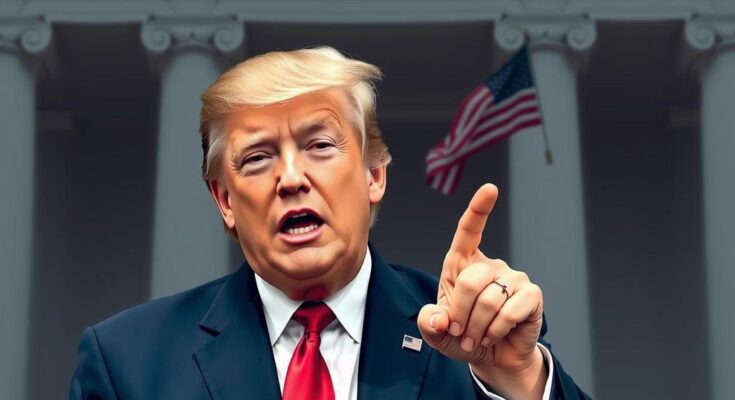Following his re-election, President Donald Trump has adopted an imperialistic stance, suggesting military control over strategic regions and pressuring Canada for integration into the U.S. This rhetoric has sparked international concern regarding sovereignty violations and potential conflicts with traditional allies. Critics emphasize that such an approach jeopardizes vital relationships and could lead to global instability.
The re-elected President Donald Trump has shifted from his initial “America First” foreign policy stance to a more imperialistic viewpoint, suggesting potential military seizures of strategic locations such as the Panama Canal and Greenland. He has proposed pressuring Canada to integrate into the U.S. as its 51st state, a move that undermines national sovereignty and could provoke international tensions. Analysts express concern that Trump’s rhetoric may embolden adversarial nations such as Russia and China at a time when global alliances are crucial.
While Trump’s supporters assert that his statements reflect strong negotiation strategies aimed at securing U.S. interests in critically important regions, critics argue that this approach risks alienating vital allies and destabilizing established norms regarding international boundaries. Indeed, Canadian officials have voiced growing frustration in response to Trump’s comments, characterizing it as confusion and chaos, while other nations declare their sovereignty remains non-negotiable. Several experts warn that this provocative language could lead to unnecessary conflict rather than constructive diplomacy in a precarious geopolitical landscape.
This article explores President Donald Trump’s evolving foreign policy postulate, specifically his recent embrace of imperialistic rhetoric after securing a second term in office. Historically, Trump has promoted an “America First” agenda, seeking to withdraw the U.S. from global engagements that do not serve direct national interests. The shift towards more aggressive posturing, involving potential military actions against allied nations, has drawn significant scrutiny from political analysts and leaders worldwide. This change occurs as the global political climate grows increasingly tense, particularly with ongoing confrontations involving major powers like Russia and China.
In summary, President Trump’s recent comments reflect a notable shift toward imperialistic rhetoric that threatens established norms of territorial sovereignty and international diplomacy. While he positions these statements as part of a broader strategy to secure American interests, the potential for escalating tensions with allies and adversaries alike raises serious concerns about their implications for U.S. foreign policy. An emphasis on cooperative international relationships is more critical than ever at this juncture in history.
Original Source: apnews.com




